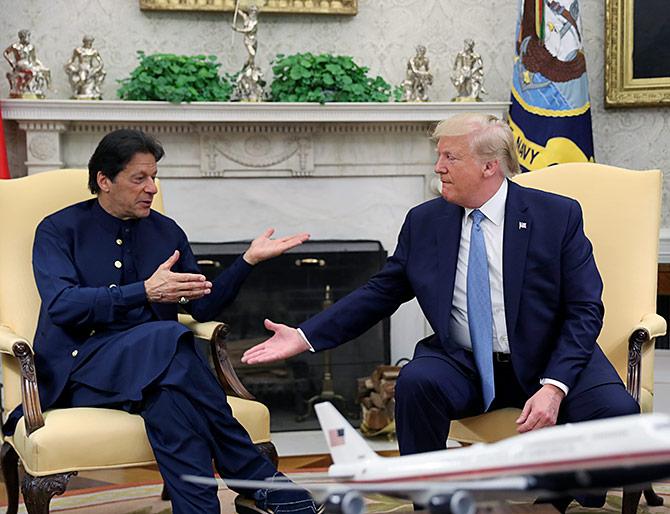'Pakistan is determined to garner the peace dividends.'
'On the diplomatic front, this will be, principally, in terms of a revival of Pakistan's relations with the US,' notes Ambassador M K Bhadrakumar.

The acrimony over the disputed results of the Afghan presidential election notwithstanding, there has been a consensus within Afghanistan for the 'reduction in violence' plan negotiated by the US and the Taliban, which commenced at midnight on Friday.
Hope has replaced despondency. President Ashraf Ghani, Chief Executive Abdullah Abdullah and former president Hamid Karzai (who is an influential political voice) have in unison welcomed the reduction in violence plan.
Notably, Abdullah sounded conciliatory, saying 'Afghans see this as a necessary stepping stone toward intra-Afghan negotiations, a permanent ceasefire and a durable settlement acceptable to our citizens. As a responsible side, we will do our utmost to facilitate, cooperate and justly resolve all outstanding issues to build consensus that engages Afghans in peace making.'
In a statement on February 21 titled 'Next Step Toward a US Agreement with the Taliban', the US state department has described the talks with the Taliban as aimed at facilitating a political settlement, 'reducing' the US military presence and ensuring that no terrorist group ever again operates out of Afghan soil.
The statement announced that a US-Taliban agreement is expected to be signed on February 29 and intra-Afghan negotiations will start 'soon thereafter' to deliver a 'comprehensive and permanent ceasefire' and the future political roadmap for Afghanistan. The US statement estimated that 'a real opportunity' is at hand.
In a separate statement, the Taliban also announced the signing of a peace agreement on February 29. It expected 'a suitable security situation' appearing between now and February 29. However, in a departure from the US statement, the Taliban highlighted 'arrangements for the release of prisoners' as one of the tasks ahead.
The Taliban statement characterised the inter-Afghan negotiations as involving 'various political parties of the country'. Significantly, neither the US statement nor the Taliban statement made any references to the Afghan government under Ghani as a protagonist. Conceivably, the upcoming inter-Afghan dialogue would have both Ghani and Abdullah as stakeholders.
The US is yet to comment on the Afghan presidential election results. Nor has Russia, China, Pakistan or Iran yet congratulated Ghani on his election 'victory'. India stands out in the region in this regard.
To be sure, this is a triumphalist moment for Pakistan. The commencement of the 'reduction in violence' pact signifies that the Afghan peace process has gained traction.
Pakistan has lost no time in claiming credit as the key facilitator of the Afghan peace agreement which is to be signed on February 29.
Pakistan's Foreign Minister Shah Mahmood Qureshi has called the peace agreement a 'historic breakthrough' and underscored the key role Pakistan played in this regard. 'We constructed a roadmap to peace,' Qureshi said in Islamabad on Friday.
In an oblique reference to the hardliners in Ghani's circle (and possibly, their supporters in India), he added, 'I also told (US Special Representative for Afghanistan Reconciliation Zalmay) Khalilzad that the US and its allies around the region must remain wary of certain elements who benefit from continued fighting. I warned him that these elements are bent on destroying the progress of our peace efforts.'
It will be a pleasant surprise in the circumstances if India gets invited to the signing ceremony on February 29. Qureshi asserted, 'The deal will be signed in the presence of Pakistan because it was impossible for the deal to come through without our efforts.'
Pakistan is determined to garner the peace dividends. On the diplomatic front, this will be, principally, in terms of a revival of Pakistan's relations with the US.
Recalling US Secretary of State Mike Pompeo's visit to Pakistan last year, Qureshi said, 'Pompeo told me that the pathway to fixing relations between Pakistan and the US came through Kabul. Now I would like to remind him that we have fulfilled all our promises. Not only did we build a peace team, but we also played our role in ensuring that the negotiations were successful.'
And there has been a paradigm shift. We can already notice that Pakistan is no longer in agony over its fate in the grey list of the Financial Action Task Force.
Simply put, the international community cannot afford to ostracise Pakistan at a juncture when Afghanistan is entering a crucial transformative phase during the coming 2 or 3 years.
Chinese Foreign Ministry spokesman Geng Shuang hinted at this on Friday at the daily briefing when he said the 'vast majority' of FATF members recognised that Pakistan has made 'enormous efforts' in improving its counter-terror financing system and, therefore, 'Pakistan will be allowed more time to continue implementing its action plan, the purpose and aim of the FATF is to support countries's efforts to strengthen institutions against money laundering and terror financing and safeguard the international financing system.'
Looking ahead, Pakistan will remain the navigator in intra-Afghan negotiations. Qureshi said: 'After February, we will try to build a delegation to promote the intra-Afghan peace process and we have also decided when and how those talks will take place. Pakistan has played its role in the peace process with wholeheartedness and honesty and it is now incumbent upon the Afghan government to do the same.'
Pakistan will ensure, no matter what it takes, that a friendly government takes shape in Kabul which will not be susceptible to Indian influence.
Ambassador M K Bhadrakumar served the Indian Foreign Service for more than 29 years. He has served as India's ambassador to Turkey and Uzbekistan and has been a contributor to Rediff.com for well over a decade.










 © 2025
© 2025